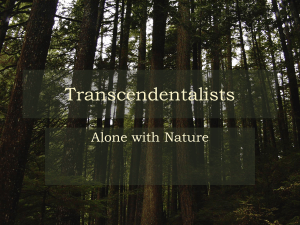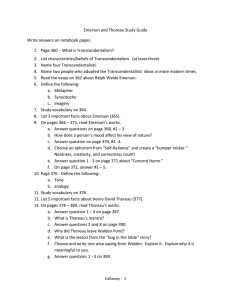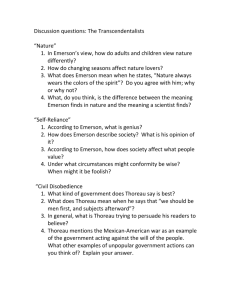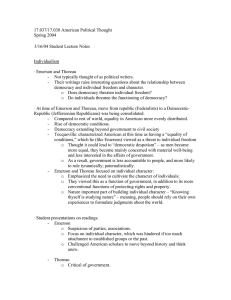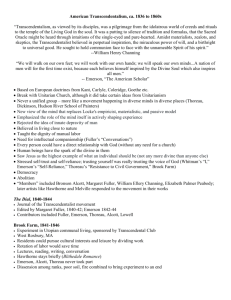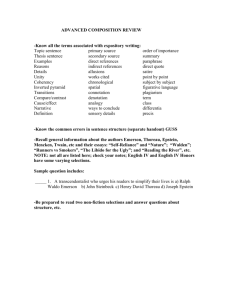Transcendentalism Discussion Questions
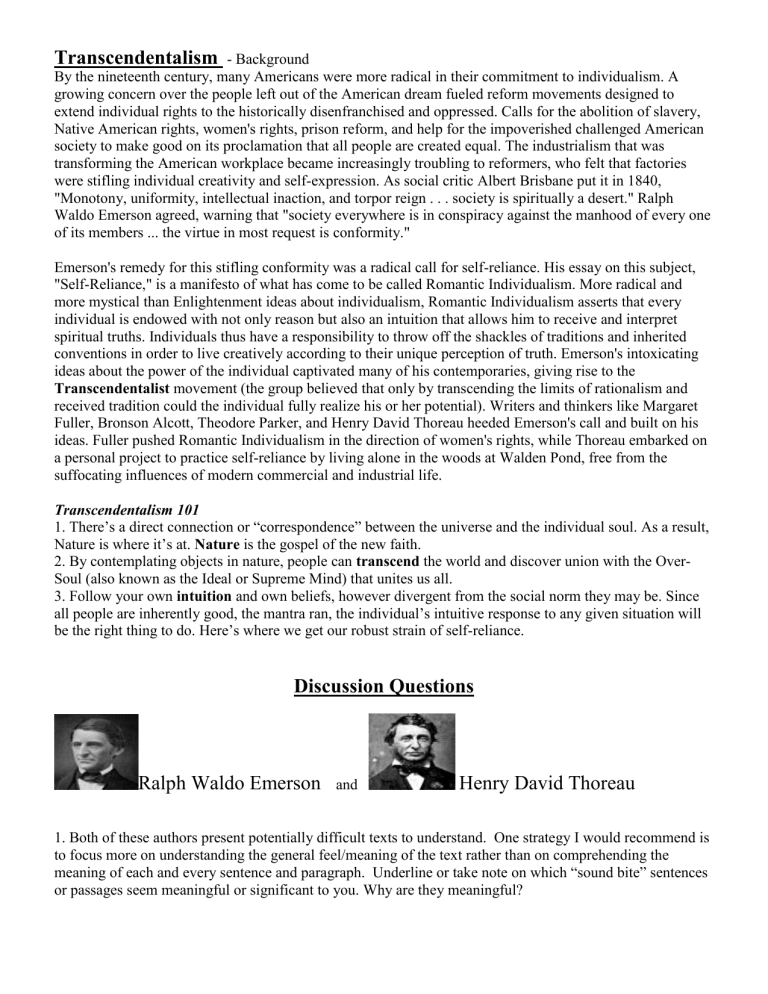
Transcendentalism
- Background
By the nineteenth century, many Americans were more radical in their commitment to individualism. A growing concern over the people left out of the American dream fueled reform movements designed to extend individual rights to the historically disenfranchised and oppressed. Calls for the abolition of slavery,
Native American rights, women's rights, prison reform, and help for the impoverished challenged American society to make good on its proclamation that all people are created equal. The industrialism that was transforming the American workplace became increasingly troubling to reformers, who felt that factories were stifling individual creativity and self-expression. As social critic Albert Brisbane put it in 1840,
"Monotony, uniformity, intellectual inaction, and torpor reign . . . society is spiritually a desert." Ralph
Waldo Emerson agreed, warning that "society everywhere is in conspiracy against the manhood of every one of its members ... the virtue in most request is conformity."
Emerson's remedy for this stifling conformity was a radical call for self-reliance. His essay on this subject,
"Self-Reliance," is a manifesto of what has come to be called Romantic Individualism. More radical and more mystical than Enlightenment ideas about individualism, Romantic Individualism asserts that every individual is endowed with not only reason but also an intuition that allows him to receive and interpret spiritual truths. Individuals thus have a responsibility to throw off the shackles of traditions and inherited conventions in order to live creatively according to their unique perception of truth. Emerson's intoxicating ideas about the power of the individual captivated many of his contemporaries, giving rise to the
Transcendentalist movement (the group believed that only by transcending the limits of rationalism and received tradition could the individual fully realize his or her potential). Writers and thinkers like Margaret
Fuller, Bronson Alcott, Theodore Parker, and Henry David Thoreau heeded Emerson's call and built on his ideas. Fuller pushed Romantic Individualism in the direction of women's rights, while Thoreau embarked on a personal project to practice self-reliance by living alone in the woods at Walden Pond, free from the suffocating influences of modern commercial and industrial life.
Transcendentalism 101
1. There’s a direct connection or “correspondence” between the universe and the individual soul. As a result,
Nature is where it’s at. Nature is the gospel of the new faith.
2. By contemplating objects in nature, people can transcend the world and discover union with the Over-
Soul (also known as the Ideal or Supreme Mind) that unites us all.
3. Follow your own intuition and own beliefs, however divergent from the social norm they may be. Since all people are inherently good, the mantra ran, the individual’s intuitive response to any given situation will be the right thing to do. Here’s where we get our robust strain of self-reliance.
Discussion Questions
Ralph Waldo Emerson
and
Henry David Thoreau
1. Both of these authors present potentially difficult texts to understand. One strategy I would recommend is to focus more on understanding the general feel/meaning of the text rather than on comprehending the meaning of each and every sentence and paragraph. Underline or take note on which “sound bite” sentences or passages seem meaningful or significant to you. Why are they meaningful?
2. Jefferson provides us with a declaration of political independence; Franklin affirms our independence from any single dogma or body of systematic thought, exhorting us to make our own systems—preferably on the model of his own. If we try reading Emerson and Thoreau as declarations of complete intellectual independence, then in what spirit should we read Emerson and Thoreau—or anybody else who offers wisdom or values? In other words, is rebellion against Emerson/Thoreau himself, moment to moment or overall, a supremely Emersonian/Thoreauian act?
3.What does Nature meant to both Thoreau and Emerson?
4. Why does Thoreau undertake his experiment in living? What is he trying to prove?
5. What values does Thoreau want us all to live by, or does he really want us to actually live by these values?
What does living by certain values meant to Thoreau? What does it mean to “live deliberately”?
6. How would you characterize Thoreau? Churlish, negative, antisocial? Idealistic, visionary, and optimistic?
Preachy and doctrinaire? Something else?
7. How exactly do Thoreau and Emerson differ from one another?
8. Do Thoreau and Emerson speak to any modern concerns for us today? How so?
